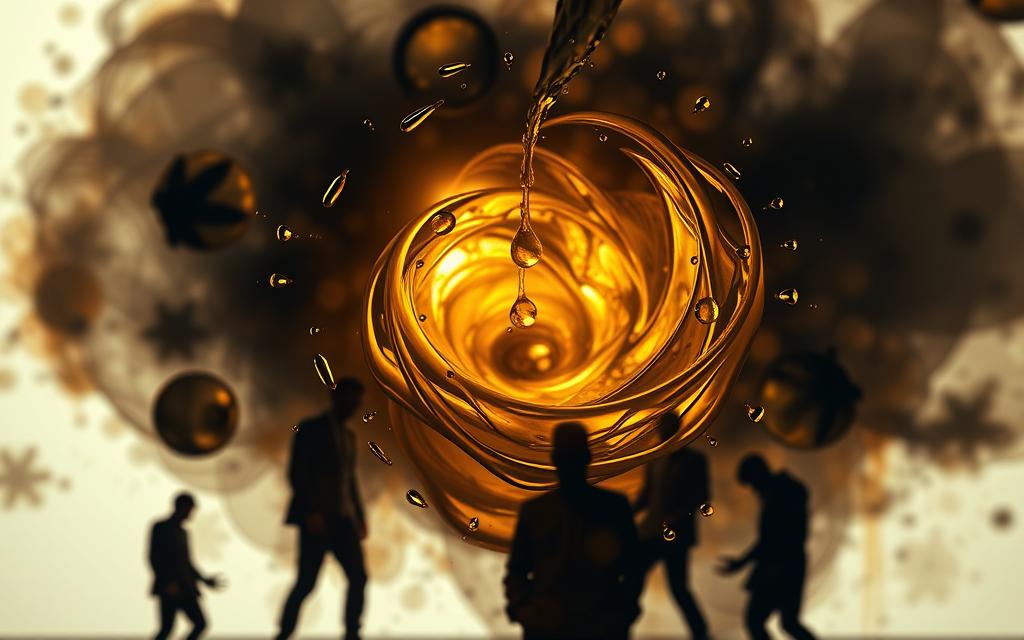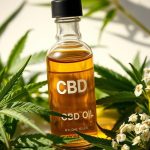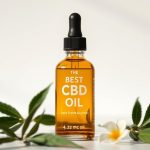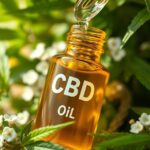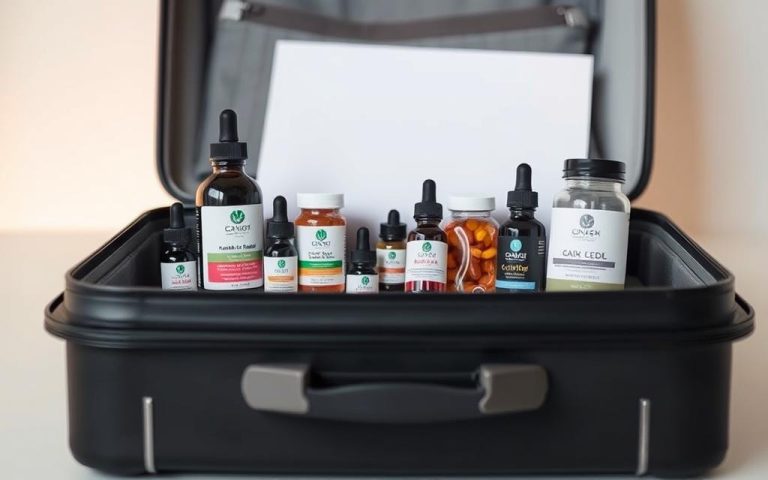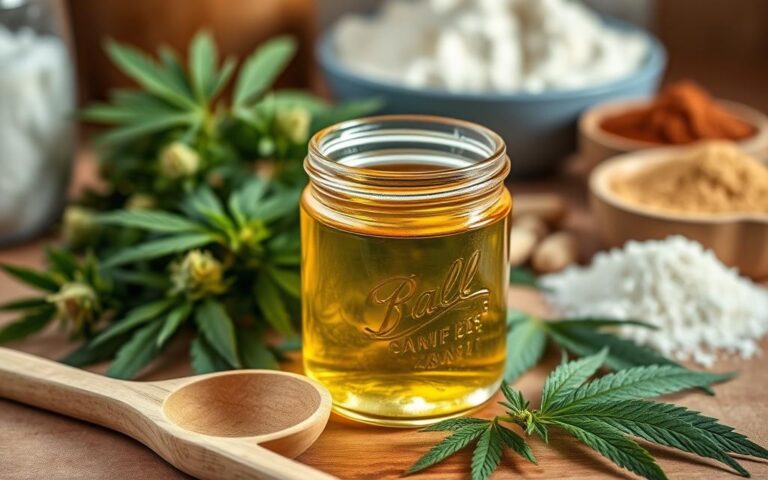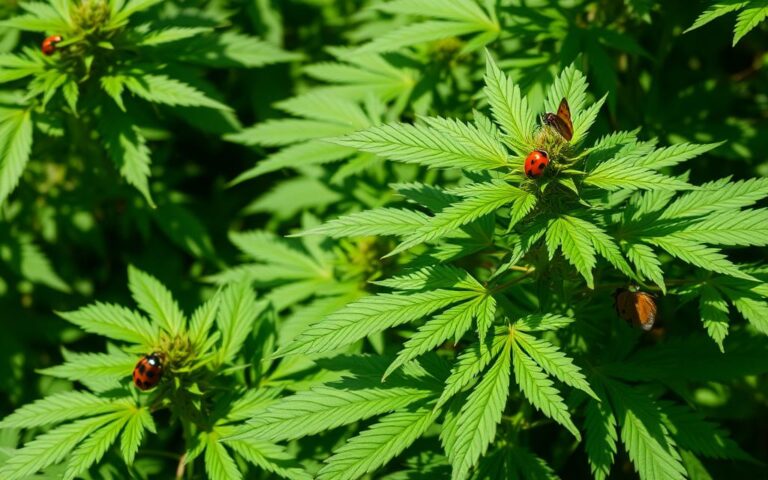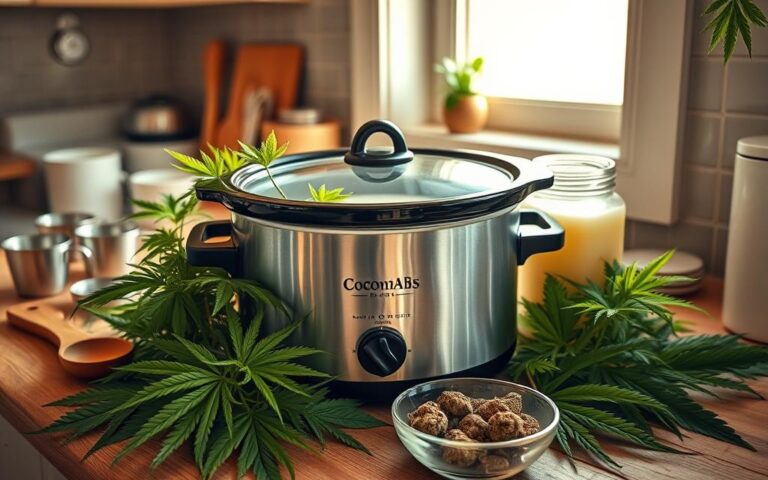Understanding the Addictive Potential of Cannabis Oil
The use of cannabis oil is growing in the UK, sparking discussions about addiction and safety. It’s crucial to understand how addiction works as this natural remedy becomes more popular. This article looks at the addictive potential of cannabis oil, including THC and CBD effects, and how they affect the brain.
Some studies have found that many cannabis oil products may have more THC than they claim. This is worrying because accurate labelling is crucial. The World Health Organization says CBD isn’t addictive. Yet, the possibility of cannabis use disorder can’t be ignored, making it vital to weigh its pros and cons carefully.
We’ll now explore cannabis oil in more detail, focusing on its components and their impact on health. The goal is to give readers the facts they need to make informed choices about using cannabis oil.
The Structure of Cannabis Oil
Cannabis oil comes from the cannabis sativa plant. It’s known for having many compounds that help with health issues. The oil includes cannabinoids and terpenes which impact the body differently. People use it in various ways as an alternative health solution.
What is Cannabis Oil?
Cannabis oil is made by extracting important compounds from the cannabis plant. It has cannabinoids like THC and CBD. THC causes a high, while CBD is good for health without making you feel high. This makes CBD popular for those who want health benefits without being intoxicated.
Key Compounds: THC and CBD
Over 100 cannabinoids are found in cannabis. THC is known for creating a high but has some side effects like dry mouth. CBD, on the other hand, has fewer side effects and is safe to use, says the World Health Organization. Both are useful for conditions like pain and anxiety but differ in their legal status and effects.
The Extraction Process of Cannabis Oil
The way cannabis oil is made affects its strength and what’s in it. CO2 extraction keeps the good properties but solvent extraction might leave bad residues. Each method changes how much THC and CBD the oil has. As cannabis gets stronger, knowing about these methods helps users stay safe.
| Compound | Effects | Legality | Average Potency |
|---|---|---|---|
| THC | Psychoactive effects, can lead to dry mouth, red eyes | Illegal in many places | Up to 20% in some regions |
| CBD | Non-psychoactive, minimal side effects | Varies by region; generally more legal | Decreasing; less than 0.15% in recent times |
Is Cannabis Oil Addictive?
Is cannabis oil addictive? This question requires us to look at what addiction means. Two important types of addiction exist: psychological and physiological. These types have a big impact on how cannabis oil works on users.
Understanding Addiction: Psychological and Physiological Aspects
Psychological addiction is about the emotional need for a substance. People might crave cannabis oil because it makes them feel good. Physiological addiction is about the body needing a substance. Without it, a person may go through withdrawal. Studies show that heavy use of cannabis oil can lead to addiction, and possibly cannabis use disorder (CUD).
It’s important to know that these types of addiction often happen at the same time. This creates a complex challenge for those affected.
The Role of THC in Cannabis Oil Addiction
THC in cannabis oil plays a big role in its addictive potential. It affects the brain’s endocannabinoid system, which changes mood, memory, and pleasure. This makes people more likely to keep using it, even when it’s harmful. Research points out that THC can lead to dependence, mainly in those who use it a lot. Yet, CBD, another component, is not addictive. So, it’s essential to understand how THC and CBD differ in affecting addiction and its consequences.
The Neurobiology of Cannabis Addiction
The way cannabis use interacts with our brain is complex. It alters brain chemistry, mainly because of a compound called tetrahydrocannabinol (THC). This leads to changes in the brain’s reward system. These changes can affect cravings and make addiction more likely.
THC works by connecting to specific receptors in the brain. This causes changes in the activity of neurotransmitters, especially in the pathways that use dopamine. Dopamine is a chemical that plays a big role in addictive behaviours.
How Cannabis Alters Brain Chemistry
When you use cannabis, THC makes your brain release more dopamine. This effect is similar to what happens with other addictive drugs. The increase in dopamine creates a cycle of behaviours that feel rewarding and are tied to using cannabis. Research has shown that using cannabis a lot can change both the structure and function of the brain. These changes are like those seen with other drug addictions.
Understanding this helps us see why about 30% of people who used cannabis in the past year could have Cannabis Use Disorder. This condition is similar to what happens with drugs like heroin and cocaine.
Impact on Dopaminergic Pathways
The dopamine pathways are key to understanding cannabis addiction. After using cannabis and the release of dopamine, you feel good. This pleasure can lead to dependency, meaning you might want more cannabis and feel bad without it.
Studies show that 67% of people with Cannabis Use Disorder might try to quit but end up using cannabis again. This shows how strong the effects of cannabis on the brain are and why addiction can happen. Research continues to look into how genes and withdrawal symptoms affect cannabis dependency. For more details, see this article.
| Statistic | Value |
|---|---|
| Global Marijuana Users | 128 – 238 million |
| Prevalence of Cannabis Use Disorder | 30% |
| Relapse Rate for Cannabis Use Disorder | 67% |
| Comorbidity with Nicotine Use | 70 – 90% |
| Heredity Influence on Cannabis Dependence | 21 – 78% |
Potential Health Risks of Cannabis Oil Use
Using cannabis oil comes with health risks that we shouldn’t ignore. These include harm to lung health, heart problems, and mental health issues. Knowing about these can help people decide if they should use cannabis oil.
Effects on Lung Health
Smoking cannabis oil can hurt your lungs. It’s linked to breathing problems and chronic bronchitis. People who smoke cannabis often might get coughs, wheeze, and more phlegm, similar to those who smoke tobacco.
Cardiovascular Concerns Associated with Cannabis Use
Studies show that using cannabis can affect the heart. It can make your heart rate go up. This is risky for people with heart problems. It could also increase the chance of having a stroke. It’s important for users to know about these heart risks.
Mental Health Impacts of Cannabis Oil
Cannabis affects mental health in complex ways. It might help some people feel less anxious or depressed.
But, for others, it could make symptoms worse. Long-term use can change your mental state and lead to mood problems.
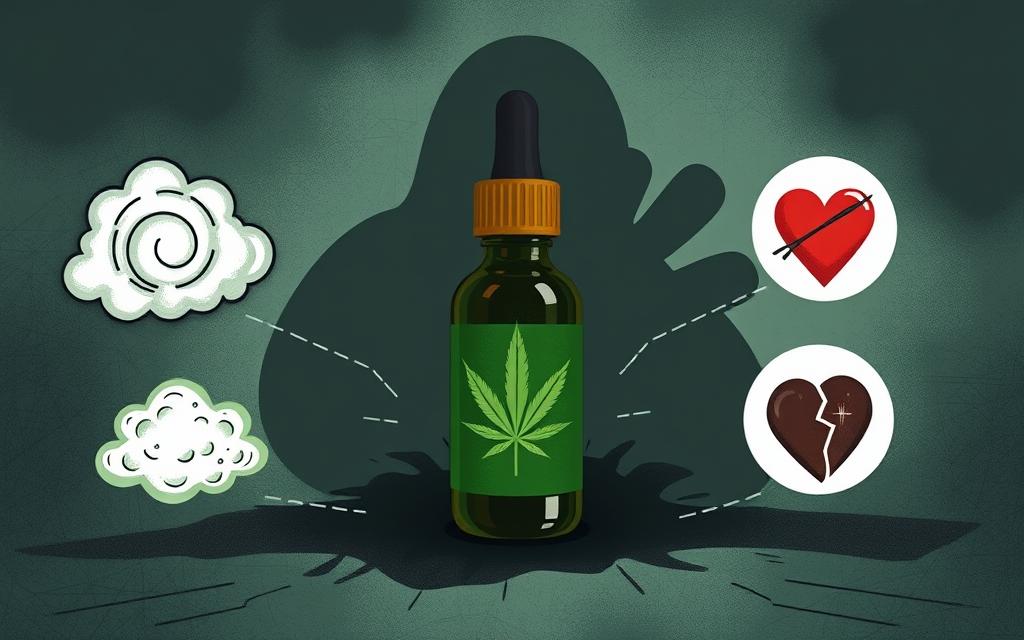
To learn more about how cannabis oil might help with cancer treatment, click here. Ongoing studies will help us understand the good and bad of cannabis oil. This includes its effects on the lungs, heart, and mental health.
Dependency and Withdrawal Symptoms
Cannabis use disorder (CUD) is becoming more common. It’s vital to know what CUD is as cannabis use grows. Studies show about nine percent of users might get addicted. This is especially true for those who start young or use it daily. It’s important for everyone to understand the issues caused by cannabis dependency.
What is Cannabis Use Disorder (CUD)?
Cannabis use disorder happens when someone can’t stop using cannabis even though it causes problems. Symptoms include needing more cannabis to get the same effect, feeling withdrawal symptoms when stopping, and using it even if it hurts their life. Many people struggle with these issues, and stronger cannabis makes it worse.
Signs of Dependency on Cannabis Oil
It’s important to know the signs of cannabis dependency. They can be:
- Increased Tolerance: Needing more cannabis for the same feeling.
- Compulsive Use: Using cannabis even if it’s causing problems.
- Impact on Daily Functioning: Use affecting work, relationships, and daily life.
Stopping or reducing use can cause withdrawal symptoms. Typical symptoms include:
- Anger and aggression
- Irritability and anxiety
- Nervousness and restlessness
- Less appetite and weight loss
- Trouble sleeping with odd dreams
Knowing about these symptoms helps support people facing cannabis dependency. There’s more focus now on how to manage withdrawal, especially with medical cannabis. This focuses on reducing the negative effects of CUD. Research and better prescribing can help. For more details, see this review.
| Signs of CUD | Withdrawal Symptoms |
|---|---|
| Increased tolerance | Anger and aggression |
| Compulsive use | Irritability |
| Impacts on daily functioning | Anxiety and nervousness |
| Decreased appetite | |
| Sleep difficulties |
Exploring CBD and Its Non-Addictive Nature
Research into cannabis has shown big differences between CBD and THC. These differences highlight CBD’s healing benefits and clear up common cannabis myths. CBD’s non-addictive traits offer relief without THC’s high, making it a viable option.
Differences Between CBD and THC
CBD and THC are cannabinoids from the cannabis plant, but they affect the body differently. THC leads to a “high,” whereas CBD does not. People say that CBD is non-addictive and may help treat addiction. The World Health Organization reports that it could reduce addictive behaviors, making it a good choice for substance use issues.
Cannabidiol’s Role in Treating Addiction
CBD shows big promise in treating substance use disorders. In studies with ex-heroin users, those given CBD had much lower cravings. This points towards CBD’s role in fighting addiction. Also, it has been seen to cut anxiety symptoms by 60% to 70% in four weeks.
The CBD market’s worth hit $18 billion in 2022 and might triple soon. Almost half of its users tried it following their doctor’s advice. This shows a growing trust in cannabidiol addiction treatment through non-addictive methods.
| Study | Findings |
|---|---|
| 2021 Study on Epidiolex | Reduced seizures by 50% to over 70%. |
| 2022 Anxiety Study | Patients saw a 60% to 70% symptom drop. |
| Heroin User Research | Cravings decreased two- to three-fold with CBD. |
| Epilepsy Study | 85% of patients noted better sleep with CBD. |
| Peripheral Neuropathy Study | Pain sensations significantly less versus placebo. |
While CBD has potential for addiction treatment, it’s important to stay informed and see healthcare experts. Using it wisely ensures you enjoy its benefits without the risks linked to cannabis. For more on this subject, you can read about cannabis oil’s health effects here.
Public Perception and Legal Stance on Cannabis Oil
The way people see cannabis oil is changing a lot. Now, many see it as a real medicine, not just for fun. This big change is reshaping our thoughts and how we accept cannabis oil in our society.
Changing Attitudes Towards Cannabis Use
Online, many say cannabis is a safe, natural cure. They share stories and tips on websites. These stories show how cannabis helps with illnesses like cancer and anxiety. This talk is key in changing how we see cannabis.
The Impact of Legalisation on Cannabis Consumption
Legalising cannabis oil has changed how much people use it and their views on it. The FDA’s new rules for CBD, like approving it for epilepsy, help gain public trust. At the same time, there’s a push for clearer rules because of some illegal sales. Predictions say U.S. cannabis sales could hit $80 billion by 2030. This shows more people are using cannabis oil in many ways.
| Year | Regulatory Action | Description |
|---|---|---|
| 2018 | FDA Drug Approval | First drug derived from cannabis approved for severe epilepsy. |
| 2020 | FDA Warning | Warnings issued to companies illegally selling CBD products. |
| 2023 | Regulatory Review | FDA acknowledges need for a new regulatory framework for cannabidiol. |
Cannabis oil’s image is dramatically improving. With each step towards legalisation, our conversations help mould the future of cannabis. This movement brings both chances and hurdles in viewing cannabis as valuable for our health.
Conclusion
This summary shows the balance between cannabis oil’s benefits and its addiction risks. THC can lead to addiction, but CBD might help as a non-addictive option. Through exploring CBD, we see its potential in helping reduce marijuana dependency. This is backed by studies showing people improving their mental health and cutting down on marijuana by using CBD.
As conversations about cannabis continue, it’s key to look at both its good and bad sides. CBD’s healing effects can manage symptoms for disorders like anxiety and pain. It does this with a low risk of addiction. We must make careful choices about using cannabis, with advice from health professionals.
The future depends on more research and education. We’re still learning about cannabis oil’s deep impact but must watch out for addiction risks. By understanding it fully, we can make wise decisions on using cannabis oil. This will help us use it safely and make the most of its advantages.
FAQ
What is cannabis oil and how is it used?
Cannabis oil comes from the cannabis plant, mainly Cannabis sativa. It’s used for fun and health reasons. It contains THC and CBD, which have different effects on the body.
What are the effects of THC and CBD?
THC can change how you see things and can be addicting. CBD doesn’t make you feel high and might help with anxiety and swelling. Studies show CBD could help fight addiction.
How is cannabis oil extracted?
Cannabis oil is made using methods like CO2 and solvent extraction. These separate the helpful parts from the plant, creating pure cannabis oil.
Is cannabis oil addictive?
The chance of getting hooked on cannabis oil mainly depends on the THC in it. THC can be addicting, but CBD isn’t. It’s important to know how different people react.
How does cannabis influence brain chemistry?
THC affects the brain by messing with dopamine, which can lead to addiction. Using it a lot might change the brain long-term, similar to other addictive things.
What health risks are associated with cannabis oil use?
Using cannabis oil can cause problems like coughing a lot, heart issues, and mental health troubles. It’s key to know these risks before you use it.
What are the signs of cannabis use disorder (CUD)?
CUD means you need more to feel good, can’t stop using it, and it messes with your life. You might also feel bad when you try to quit.
How does CBD differ from THC in terms of addiction?
CBD isn’t addicting like THC. It might even help treat addiction. The way it works with your body reduces the chance of getting hooked.
How has public perception of cannabis oil changed?
Now, more people see cannabis oil as good medicine, thanks to more legal support and better understanding of its benefits. But, it’s also important to keep learning and be safe while using it.
